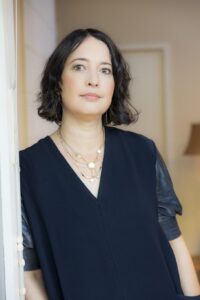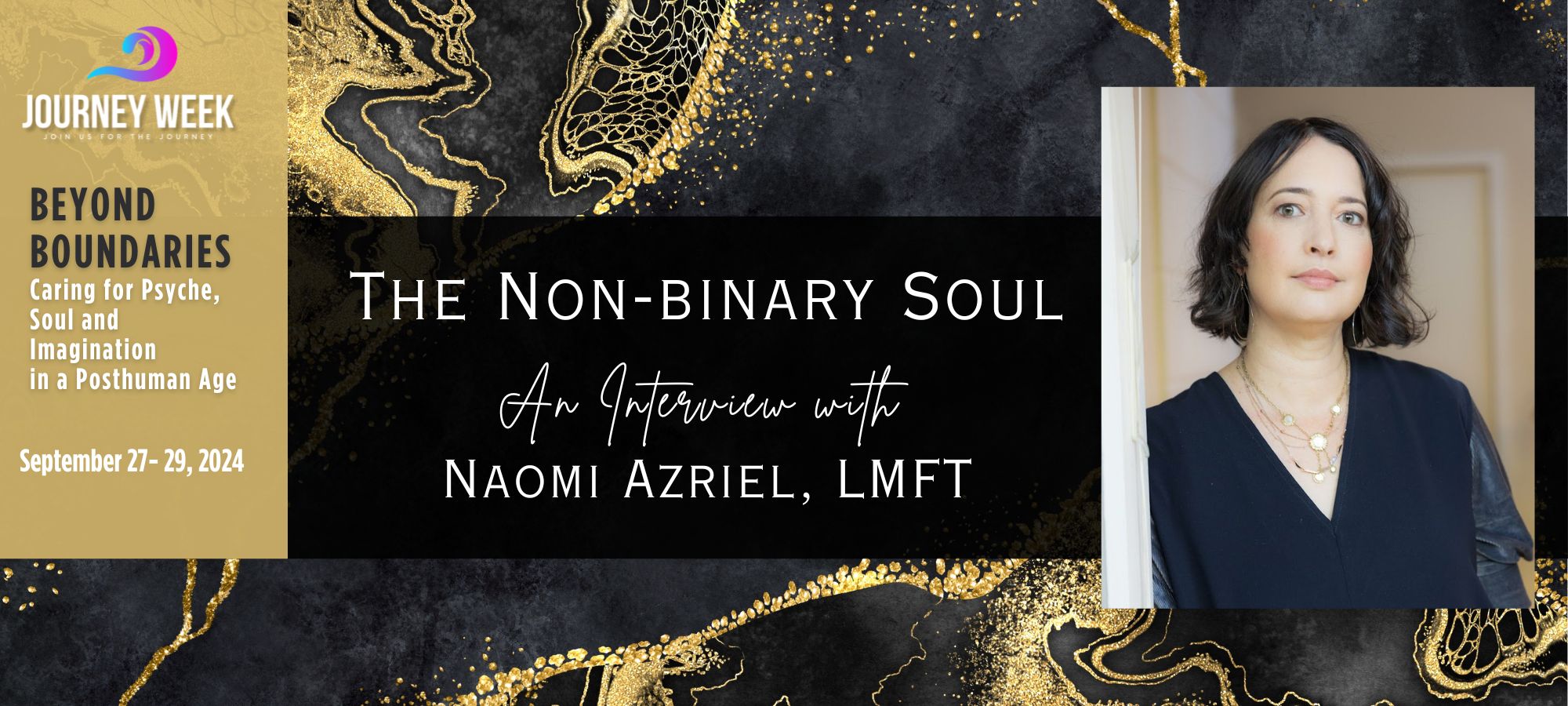Naomi Azriel, LMFT, is a Jungian analyst, scholar, activist and poet, who will be one of the presenters in the panel discussion “The 21st Century Queer Psyche Through a Jungian Lens” at Pacifica’s Journey Week. Journey Week is an immersive week of learning and connecting at Pacifica Graduate Institute, September 27th – 29th, 2024. For more information and to register, visit us here.
Angela Borda: Thank you for speaking with me today. To begin, perhaps you can share with us a little about your background and what inspires you and fulfills you most in your work as a psychotherapist?
Naomi Azriel: I’m a Jungian analyst. My clinical background is in feminist activism. I was a rape crisis activist for several years back in Jerusalem, before immigrating to the U.S. In the U.S., I was involved with the sex worker community. I volunteered with a Bay Area organization, St. James Infirmary, focusing on occupational safety and empowerment for sex workers. I also worked in the HIV world with HIV+ women. So that’s my background that led me to more clinical work. In the clinical field, I’m interested in working with queer and trans patients and with survivors of early sexual trauma. I work with people of all genders around dreams and the imaginal. I’m interested in intergenerational trauma and resilience. I work with people who are connected with their ancestors both through wounding and strength. I work with immigrants, refugees, and people with multicultural identities.
I am inspired by the mystery and complexity of the human psyche. That’s what compels me. Just how unknowable the human soul is, and how interesting and engaging it is to interact with it.
Angela: I’m looking forward to hearing the “The 21st Century Queer Psyche Through a Jungian Lens” panel that you will be a part of. What will your presentation focus on?
Naomi: This panel is a three-person version of an eight-person panel that presented in Zurich last summer, at a conference celebrating 75 years of the C.G. Jung Institute in Zurich. As far as we know, it was the first time there was an intentional presence of queer Jungian scholarship at an international Jungian conference. My part will focus on a concept I have been developing, “the Nonbinary Soul”. The gist of this concept is twofold: first, I look at how for specific (trans, non-binary) people there is a soul experience that transcends male and female, masculine and feminine. Second, it’s also a concept relevant to all people, not just trans and non-binary people. It’s an invitation for all of humanity to evolve further from the restricting ideas of the gender binary into something more complex and more alive. It’s something each of us can open up to and develop within ourselves.
Angela: I’m curious about the idea of the non-binary soul. Do we all have nonbinary souls? How does gender relate to our soul?
Naomi: I wouldn’t say that we all have non-binary souls. But the non-binary soul can move each of us, if we’re open to responding to it. One of Jung’s foundational ideas is that at a soul level, gendered images speak to us and stir us at the deepest soul level. Jung called those images the anima and the animus. The non-binary soul is a way of taking that concept from Jung and further developing it while incorporating contemporary understanding of the infinite possibilities of gender. Jung thought men must evolve beyond seeing themselves as only masculine and women must evolve beyond seeing themselves as only feminine. Having lived a hundred years ago, as far as that concept could go for him was to say that each person has a soul that includes the opposite of who they see themselves consciously to be. In today’s terms, most people see themselves as cis (non trans). So if we follow up on Jung’s thinking and expand it and apply it to contemporary culture, the “other” that we have to open up to is that trans or non-binary part of ourselves. The soul in a Jungian sense is what is most deeply human and what connects us to what is beyond us, to the transpersonal. Jung understood that soul has something to do with the mystery or essence of gender, and I expand and deconstruct that concept in my conception of the Non-Binary Soul.
Angela: What are you looking forward to discussing with your colleagues and participants during the panel?
Naomi: For me, the panel is not about how make more room for queer people in the Jungian world. Rather, it’s about queering the Jungian world and Jungian scholarship. I don’t feel interested in how to make the Jungian world more inclusive of queers. What’s important to me is how does Jungian scholarship and analytic psychology become more queer, when we think of queer not only as an identity marker, but as a particular stance toward being human. Becoming more queer means becoming more expansive, more individuated, more mature, more spiritually alive. Specifically, my interest is to explore this through the unconscious, so I’ll be using dream material and the imaginal.
Angela: Your work as a Jungian analyst focuses on “the intersection of Jungian depth psychology with feminist and queer topics, including the Cassandra Complex, the transference field, dream work and the liberatory potential of trans identities.” I think I know what the Cassandra Complex is, but this is the first time I’ve interviewed someone who lists it as one of their main focuses. I wonder if you could speak a little about the Cassandra Complex as it relates to your work?
Naomi: The Cassandra complex is not my term, but it’s a classical Jungian idea that was developed by Toni Wolff and other post-Jungians. As we know, Jung and Jungians feel that there are multiple complexes that are core to human beings beyond the Oedipal. The Cassandra complex is one of those complexes that explains something fundamental about human communities, and it’s attributed to women in particular. It’s related to a woman who has a tendency to see “the collective shadow,” in other words what everyone else is unwilling to see, and to point it out, but she isn’t believed. She’s seen as histrionic. My development of this complex is that I looked at it with the classical Jungian approach to complexes, as rising from a pair of opposite human phenomenon. So what is the other side of this complex? In this case, it is Apollonian aspects of the group or community. This means that the collective is so rigid and resistant to change, that they’re unopen to hearing what the Cassandra woman brings forth. I use discussion of this complex to talk about the Me Too Movement, sexual harm happening in the culture at large and within Jungian analytic circles in particular.
Angela: What are you most looking forward to about Journey Week?
Naomi: The paper I’m presenting at the panel is about to come out in Psychological Perspectives; Marybeth Carter arranged for a special issue on queer and trans Jungian scholarship that I’m honored to be a part of. And I’m looking forward to being part of the bigger conversation at Pacifica.
Angela: Thanks so much for your time and thoughtful answers, and I look forward to listening to you talk at Journey Week!
Journey Week is an immersive week of learning and connecting at Pacifica Graduate Institute, September 27th – 29th, 2024. For more information and to register, visit us here.

Naomi Azriel, LMFT, is a Jungian analyst, scholar, activist and poet practicing in Oakland, CA. Her work can be found in the Jung Journal and Psychological Perspectives. She teaches and lectures internationally on the intersection of Jungian depth psychology with feminist and queer topics, including the Cassandra Complex, the transference field, dream work and the liberatory potential of trans identities.

Angela Borda is a writer for Pacifica Graduate Institute, as well as the editor of the Santa Barbara Literary Journal. Her work has been published in Food & Home, Peregrine, Hurricanes & Swan Songs, Delirium Corridor, Still Arts Quarterly, Danse Macabre, and is forthcoming in The Tertiary Lodger and Running Wild Anthology of Stories, Vol. 5.


